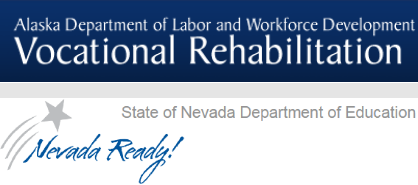NOTE: October is National Disability Employment Awareness Month.
The National Technical Assistance Center on Transition (NTACT) assists state and local education agencies and VR agencies and service providers, and it keeps close contact with these agencies and providers in order to share real stories of real youth being supported in transition programs. Alaska and Nevada are just two of the states that are creating programs to help youth with disabilities transition into a work environment.
Alaska Division of Vocation Rehabilitation
Alaska Division of Vocational Rehabilitation (DVR) provided pre-employment transition service—a requirement of the Workforce Innovation and Opportunities Act (WIOA) activities to 802 Alaskan students this year through a number of statewide initiatives including Transition Camps and its Summer Work programs.
Transition Camps
Transition Camps help students develop a vision for what their future can be by exposing them to career exploration and the resources they may need to successfully transition from school to work. These camps, located in predominantly rural areas of the state and juvenile justice facilities, served 236 students. Transition camps are a partnership between DVR, Disability Employment Initiative (DEI), and the Department of Education.
Summer Work Programs
Summer Work, a partnership program between DVR and DEI, focused on providing students with disabilities with a chance to have a paid 160-hour work experience to become work ready. Summer Work served 182 students in 2018, and 99 Alaskan businesses provided work sites for students engaged in the program. Summer Work programs are implemented by school districts and community agencies in rural and urban areas. This year’s big success was the Cordova School District summer program. Eight of the 14 students who participated transitioned to competitive integrated employment at the end of their work experience!
Nevada Department of Education
The Nevada Department of Education hosts and organizes the annual Nevada Student Leadership Transition Summit (NSLTS). The summit provides a forum for high school students with disabilities to participate in sessions focused on disability awareness, self-advocacy, resources for career and college planning, and networking events with providers and other teens across the state.
NSLTS can have a lasting impact on people’s lives.
Kascia Tognoli attended the NSLTS in 2008 and 2009 as a student from Lyon County School District’s Yerington High School.
NSLTS helped Kascia realize what she wanted to do for a career. When she reflected on her time at NSLTS to the summit’s organizer Jennifer Kane, Kascia said:
I knew from then on what I really wanted to do which is what I am doing now, helping adults and students with disabilities. I remember going to my mom and telling her what they were talking about at the conference, and that I was going to do that one day. You [NSLTS] are the main reason why I started doing what I do… At the conference I came to terms that I needed to love my disability because it makes me who I am!… I just want to tell you thank you from the bottom of my heart for putting on that conference, it changed my life!
Kascia is employed currently with K.E.T. Consulting, LLC—a provider of Pre-Employment Transition Services in the state.
The National Technical Assistance Center on Transition (NTACT), funded by the U.S. Department of Education’s Office of Special Education Programs (OSEP) and the Rehabilitation Services Administration (RSA), assists state and local education agencies, state vocational rehabilitation (VR) agencies and VR service providers in implementing evidence-based and promising practices to help ensure students with disabilities, including those with significant disabilities, graduate prepared for success in postsecondary education and employment.
Blog articles provide insights on the activities of schools, programs, grantees, and other education stakeholders to promote continuing discussion of educational innovation and reform. Articles do not endorse any educational product, service, curriculum or pedagogy.


